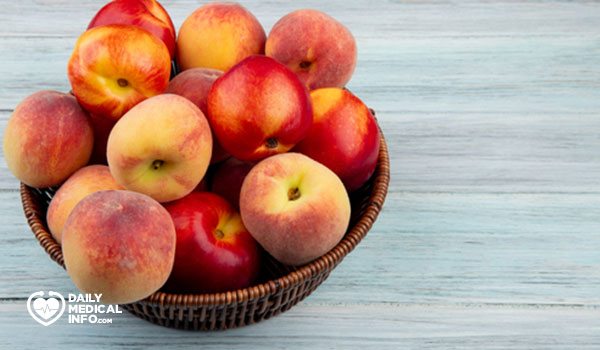The benefits and harms of nectarines and the difference between them and peaches
Have you ever heard of nectarines? Do you confuse this fruit with peach fruit? Learn with us from the following paragraphs about the nectarine fruit, its nutritional value, the many health benefits it provides to the body, the difference between it and peaches, in addition to its effect on weight, the colon, and some other important information that may benefit you.
Nectarine fruit
Nectarine is a summer fruit that is sweet and delicious. It has a smooth and shiny crust, similar to the usual peach fruit. The origin of the main nectarine fruit is the country of China, and in many regions peach has been replaced by nectarine.
Its fame is due to the fact that it contains a large and varied amount of vitamins and minerals that are beneficial to the body, and it also offers a variety of health benefits, in addition to its delicious taste.
Nutritional value of nectarines
One medium-sized nectarine, or approximately 142 grams, contains the following nutrients:
- 63 calories.
- 0.5 grams of fat.
- 15 grams of carbohydrates.
- 1.5 grams of protein.
- 2.4 grams of fiber.
- 11.2 grams of sugar.
- 6% of the body’s daily need for potassium.
- 10% of the body’s need for niacin or vitamin B3.
- 8.5% of the body’s daily need for vitamin C.
- 13.6% of the daily body need of copper.
The benefits of nectarines
The benefits of nectarine fruit for the body and general health include:
1- Boost immunity
Nectarines contain a large amount of minerals, especially copper, potassium, vitamins B3 and vitamin C. Vitamin C helps boost immunity by increasing the production of white blood cells, thus defending the body against infection and inflammation. It also contains small amounts of vitamin A, magnesium, zinc, iron and many other minerals that are important and beneficial for immunity.
2- Weight control
This fruit helps control weight in the following ways:
- It is a sweet-tasting fruit, but it is low in calories and fat, so it can be eaten within a balanced diet when you want to lose weight.
- Rich in fiber, which helps in feeling full for a long time, thus reducing any excessive desire to overeat.
3- Promoting skin and skin health
This fruit contains vitamin A and copper, as we mentioned before, and these elements are important for promoting healthy skin, as vitamin A protects the skin from harmful ultraviolet rays, and also affects and enhances the density of the skin. While copper helps stimulate the formation of collagen, which gives the skin its glow, which helps maintain skin moisture and tone.
4-lower blood pressure
Some experiments indicated that increasing copper intake can help lower blood pressure, and also help prevent heart disease related to high blood pressure. As mentioned earlier, nectarines contain an abundant amount of copper, so eating them can help lower blood pressure.
5- Prevention of cancer
Some recent studies have shown that eating green and yellow fruits and vegetables can help reduce the chances of cancer, and nectarines fall into this category.
This fruit also contains anthocyanin, which some scientific studies have proven to have an effect in preventing cancer, as this substance contains anti-tumor and anti-inflammatory properties, but confirmation of this effectiveness still requires more studies.
6- Prevention of anemia
Eating this fruit along with other foods rich in iron can help prevent anemia or anemia, as the vitamin C in the fruit supports iron intake, by converting it into a form that is easily absorbed by the body, and thus benefiting from them.
Benefits of nectarine for women
Because nectarines are high in potassium, this fruit can help reduce some of the risks associated with pregnancy, most notably high blood pressure.
It is worth noting that high blood pressure during pregnancy is associated with the occurrence of many other problems such as premature birth and the risk of exposure to cesarean section or the death of the mother during childbirth, and treatment of blood pressure problems may help avoid exposure to all the aforementioned problems.
Therefore, it is advised to increase the intake of potassium and eat foods rich in it in the event of pregnancy, such as nectarines, in order to obtain a safe and healthy pregnancy.
Damage to nectarines
Allergy to nectarine is not considered common, but in some cases some allergy symptoms may appear after eating this fruit, due to what is scientifically known as Oral Allergy Syndrome, and it occurs when the body mixes certain types of food with herbal or green pollen, which lead to a real allergy.
When this type of allergy occurs, the following symptoms may appear on the body:
- Itching and burning sensation in the mouth.
- Swelling of the lips or a feeling of numbness in them.
- itchy throat
- Runny nose or congestion.
These symptoms usually disappear by swallowing the fruit, but when they persist, a doctor should be contacted immediately, and these symptoms can be avoided by cooking nectarines.
There are also no known drug interactions with nectarines, but it is recommended to avoid eating this fruit if you follow a potassium-free diet, and this diet is usually recommended for patients with chronic kidney disease.
Does nectarine gain weight?
There is not enough evidence to support this theory, as all available data indicates that this fruit supports weight loss due to its low number of calories and the amount of fat in it, but it must be remembered that obtaining the benefits of any food for weight loss requires combining this food with a healthy balanced diet, and eating it In moderate amounts, too much of any food, even low-calorie foods, may cause weight gain.
drips and they said
Nectarines are classified as high-FODMAP fruits, i.e. foods that contain fructose sugar, and this type of sugar may cause an increase in digestive symptoms associated with colon problems. Therefore, this fruit is considered among the types that lead to irritation of colon symptoms, and it is not recommended to eat it for patients with colon, and we recommend that you consult a doctor first to find out whether it is safe for the general health condition or not.
The difference between peaches and nectarines

The only difference between them is that peach is a stone fruit with a rough skin or has a velvety texture, while nectarine is a type of peach with a soft texture and smooth skin, and they are similar in the following:
- The inside of both fruits is usually white or yellow.
- They both contain the same nutrients, as they both contain natural sugar, fiber, and a large number of vitamins and minerals.
- Both are summer fruits that can be eaten raw or added to salads and desserts.

